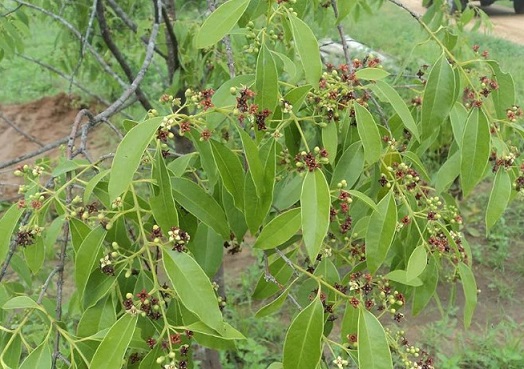Herbs And Phytochemicals: Alpha-Santalol From Sandalwood Can Prevent Development Of Prostate Cancer
Nikhil Prasad Fact checked by:Thailand Medical News Team Feb 14, 2024 2 years, 1 week, 1 day, 7 hours, 23 minutes ago
Herbs And Phytochemicals: Sandalwood, with its rich history spanning centuries across various cultures, has been revered not just for its aromatic properties but also for its medicinal benefits. Among its many constituents, alpha-santalol, extracted from the core of sandalwood trees, has emerged as a promising agent in the fight against prostate cancer. This
Herbs And Phytochemicals news report delves into the groundbreaking research conducted by a team from Florida Atlantic University's Schmidt College of Medicine and collaborators, showcasing the chemo-preventive properties of alpha-santalol against prostate cancer development.
 Alpha-Santalol From Sandalwood Can Prevent Development Of Prostate Cancer
The Essence of Sandalwood
Alpha-Santalol From Sandalwood Can Prevent Development Of Prostate Cancer
The Essence of Sandalwood
Sandalwood oil, derived from the heartwood of Santalum album trees, has been utilized in perfumes, cosmetics, and even culinary applications due to its distinct aroma and therapeutic potential. However, it's the presence of alpha-santalol, constituting a significant portion of sandalwood oil, that has piqued the interest of researchers in the realm of cancer prevention. Alpha-santalol, a sesquiterpenoid derivative, is known for its diverse biological activities, including antibacterial, anti-inflammatory, and anticancer properties.
Unveiling the Potential
The research team embarked on a pioneering endeavor to explore the in vivo efficacy of alpha-santalol in combating prostate cancer using a transgenic mouse model. Their findings, published in the esteemed journal Phytomedicine Plus, unveiled compelling evidence of alpha-santalol's ability to mitigate prostate cancer development. This study marks the first demonstration of alpha-santalol's chemo-preventive properties in an animal model, a significant milestone in the quest for novel cancer therapeutics.
A Shield Against Cancer
Through meticulous experimentation, the researchers demonstrated that administration of alpha-santalol led to a notable decrease in the incidence of prostate tumors in mice. Moreover, it didn't induce weight loss or adverse side effects, underscoring its safety profile. The mice treated with alpha-santalol exhibited a remarkable preservation of normal tissue, delaying the progression from precancerous conditions to advanced carcinoma. This safeguarding of healthy tissue holds immense promise in combating the mortality associated with advanced stages of prostate cancer.
Preservation of Normalcy
One of the most striking revelations was the preservation of normal tissue in alpha-santalol-treated mice, delaying the progression from precancerous conditions to advanced carcinoma. This safeguarding of healthy tissue holds immense promise in combating the mortality associated with advanced stages of prostate cancer. Histological analysis revealed that the area occupied by normal tissue in alpha-santalol-treated mice was significantly higher compared to control mice. Furthermore, the incidence of poorly differentiated carcinoma was significantly lower in the alpha-santalol group, indicating a protective effect against cance
r progression.
Unraveling Mechanisms
The study delved deep into the molecular mechanisms underlying alpha-santalol's chemo-preventive effects. It was found to hinder cell proliferation while inducing apoptosis, or programmed cell death, in cancerous cells—a pivotal mechanism in thwarting cancer progression. Immunohistochemical analysis revealed a decrease in cellular proliferation markers, such as Ki-67, in alpha-santalol-treated mice compared to controls. Additionally, alpha-santalol treatment resulted in an increase in apoptotic bodies, further confirming its role in promoting programmed cell death in cancer cells.
From Lab to Clinic
The translational implications of these findings are profound. With prostate cancer ranking as the second leading cause of cancer-related deaths in men, the need for novel preventive and therapeutic strategies is paramount. Alpha-santalol emerges as a natural ally in this battle, offering a targeted approach with minimal side effects. The promising results obtained in preclinical models pave the way for further clinical studies to evaluate alpha-santalol's efficacy in human prostate cancer patients.
The TRAMP Model
The utilization of the Transgenic Adenocarcinoma of Mouse Prostate (TRAMP) model underscores the relevance of this research in mirroring human prostate cancer progression. By replicating various lesion grades and cancer stages, this model serves as a robust platform for assessing the efficacy of potential preventive agents. The TRAMP model mimics the natural history of prostate cancer in humans, making it an invaluable tool for translational research.
Molecular Insights
Further analysis elucidated the intricate molecular interplay orchestrated by alpha-santalol. It downregulated key proteins involved in cell cycle regulation and apoptosis resistance, thereby tipping the balance in favor of cancer suppression. Western blot analysis revealed a decrease in the expression of proteins associated with cell cycle progression, such as cyclin-dependent protein kinase (Cdc2/Cdk1) and Cyclin D, in alpha-santalol-treated mice. Moreover, the levels of anti-apoptotic proteins, such as survivin and X-linked inhibitor of apoptosis (XIAP), were markedly reduced in alpha-santalol-treated samples compared to controls.
A Promising Future
The implications of this study extend far beyond the laboratory. Alpha-santalol beckons as a beacon of hope in the realm of cancer prevention and treatment. As further research unfolds, its potential as a clinical agent against prostate cancer holds immense promise. The development of novel chemopreventive strategies is essential in reducing the burden of prostate cancer and improving patient outcomes. Alpha-santalol, with its multifaceted pharmacological properties, represents a promising avenue for achieving this goal.
Conclusion
In the quest for effective cancer prevention and treatment, nature often holds the key. Alpha-santalol, a humble constituent of sandalwood oil, emerges as a potent ally in the fight against prostate cancer. Through rigorous scientific inquiry and translational efforts, it has transcended from ancient wisdom to modern-day medicine, offering a ray of hope to countless individuals affected by this formidable disease. As research progresses, the journey towards harnessing nature's healing powers continues, with alpha-santalol paving the way for a brighter, cancer-free future.
The study findings were published in the peer reviewed journal: Phytomedicine Plus.
https://www.sciencedirect.com/science/article/pii/S2667031324000010
For the latest on
Herbs and Phytochemicals, keep on logging to Thailand Medical News.
